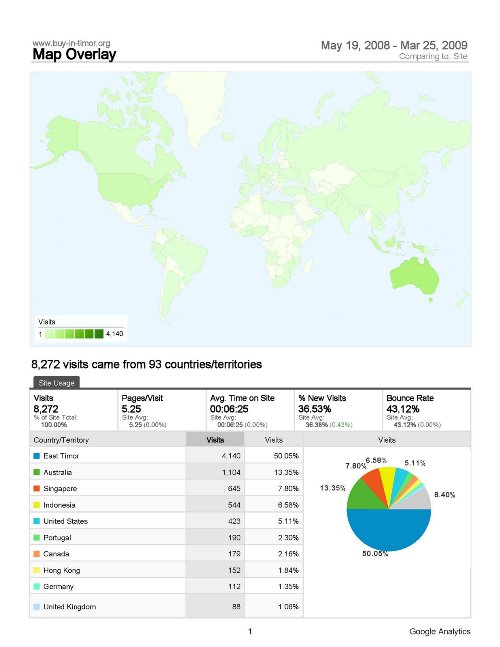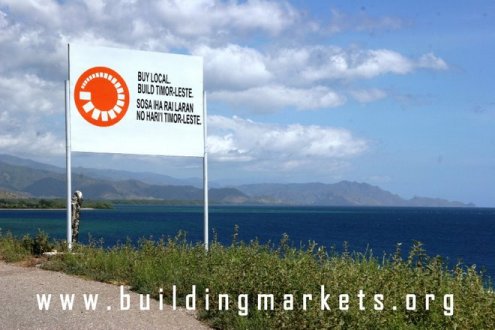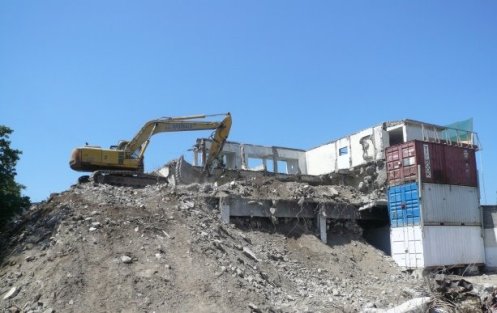Being willing to listen what bloggers are talking about, Global Voices faces big challenges to cover the blogospheres of regions where people are not using citizen media. That is the case of East Timor, where there are many Internet connectivity problems which make blogging very difficult. But what are the challenges that bloggers from East Timor face when uploading content to the Internet? And what are the projects, nonetheless, arising in the Timorese blogosphere?
It is common to hear Timorese bloggers sighing at their inability to post as often as they would like to. Ângela Carrascalão, a blogger and news correspondent for the popular Portuguese newspaper Público, started her blog [pt] in 2006 and today still regrets the obstacles she finds while writing for the Web.
Está lenta, muito lenta a Internet. Enervantemente lenta! A lentidão não se prende todavia com o calor intenso que é normal nesta altura do ano, é a razão lógica de ser da nossa indolência e nos tolhe os movimentos…
The same author makes an interesting point about the real need for Internet access in a country where there is a lack of almost everything:
Nos distritos do interior não há Internet. Poderia ser simples dizer isto e com isso concluir que estamos mal, que somos um país subdesenvolvido. Mas, que importa que não haja Internet, se ali, no Timor profundo, falta tudo, ou quase tudo?
There is no doubt that the Internet plays an important role in providing communication channels as well as education to isolated areas. Presumably due to the actual delay concerning Internet technologies in the country, later this year the Government will launch an amusing solution based on the broadcast of pedagogical television shows [pt]. This system is not innovative, as it was common in Europe in the 80’s, but it apparently provides a fitting solution for the absence of infrastructures that East Timor still faces, 10 years after the special autonomy referendum was held.
Nevertheless, more and more initiatives are appearing willing to act on economical development through the use of online communication tools for trade. One example is the Peace Dividend Trust, a non-profit foundation dedicated to the “support of long-term economic recovery by increasing the purchase of goods and services available in the country”.
One of the Peace Dividend Trust projects in East Timor is a Procurement Database that aims to “identify goods and services” and “to work with local businesses specifically to facilitate the process of switching to local suppliers […] that can reliably meet the operational needs of international agencies”.
Their website provides a powerful search tool where visitors can look through 26 different businesses categories in all the districts of East Timor. Through this, it is possible to find quite thorough information about each formal business, concerning the type of activity, services and products available, contacts, references and other useful information. It also supports an interface for people to provide feedback about each business. Buy in Timor exceeded 2,000 entries in March 2009, becoming a unique reference concerning local economy and the private sector development and entrepreneurship. The following blog post from the end of March 2009 reported:

To date 50.05% of visits have come from users inside Timor-Leste, 13.37% from Australia, 7.80% from Singapore, and 6.48% from Indonesia. (see graphic above)
There are now 2,013 unique business profiles online and the job of verifying further new businesses in Dili and the districts continues.
The Timor-Leste Procurement Database has had 43,435 hits in just 10 months. These hits have been generated by 8,272 separate visits. The website is designed to connect institutional and individual buyers (both inside and outside Timor-Leste) with domestic suppliers.
The above quote is taken from one of several blogs that have been recently launched by Peace Dividend Trust Building Markets project in East Timor. These blogs provide up to date information while enhancing new ways to “Buy locally, rebuild markets, employ young men and increase the stability of post-conflict and fragile states”. One of the most active blogs is Serbisu Iha Timor-Leste / Jobs in Timor-Leste [te].
Ema hot-hotu bele uza blog ida ne'e atu hare Vaga Serbisu iha Timor-Leste no atu buka informasaun kona ba serbisu iha Timor-Leste laran e liur.
Through the Building Markets project, a big diversity of businesses are promoted in different blogs. The Carpinteria Sanders [en], for example, is a blog to support a new carpentry furniture supplier from Dili. Diverse woodwork is presented at Manu-Koko, a group of artisans that make carvings from Mahogany, Teak, Mangrove, and Saria. It is also possible to find real estate sources, such as Aluga Uma Timor which aggregates several rental opportunities all over the country and Itimuran, for eco-accommodation on Atauro island. Cheap Car Dili posts information on cars for rent, and Diamond Workshop tells the story of a vehicle repair and maintenance business.
The Procurement Database project addresses the international community as the main consumer of the local services which are being promoted online, and reportedly it reaches many people in the country. The other part of the challenge ahead is to get local people – the national community – involved, both as consumers and also as content managers for those blogs.
In fact, not many initiatives are known to empower Timorese people, especially from rural areas, through online technologies. Therefore communication, trade and education in the first person through these media still has a long way to go in East Timor.
***
This is the last piece in a series of posts to celebrate the existence of the Internet in East Timor and to draw attention to the current situation. The first article explained the huge digital divide in the country, while in the second one Jen Hughes was interviewed, explaining how she founded Suai Media Space, whose main objective is to make the voices of Suai youth heard all over the world.









6 comments
Sara, thanks for this post. My main source of information on East Timor used to be the blogs run by some of the expats. Thanks for translating Portuguese sources.
Another great post Sara, thanks for this series on East Timor, i hope it opens up some productive conversations in the country about the future of the internet there.
Ryan